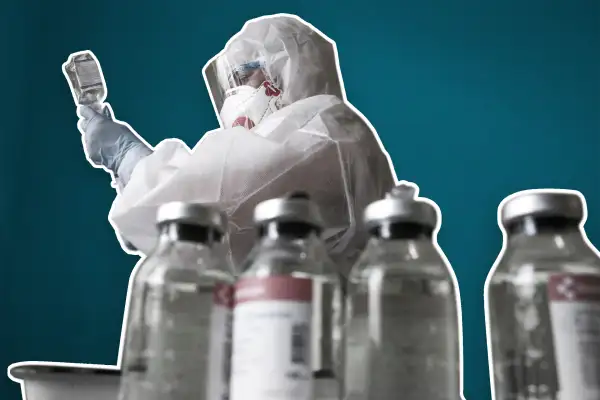Average Costs for a COVID-19 Hospital Stay Top $400,000 in Some States: Study

In the U.S., hospital stays for any reason typically come with bloated bills. But new data show that hospitalization for COVID-19 is on an entirely different level — costing, in many cases, hundreds of thousands of dollars before insurance.
Fair Health, an independent nonprofit that tracks health care costs, recently released an interactive tool that displays state-by-state costs associated with COVID-19 treatment.
“It is notable how widely COVID-19 costs range depending on the severity of the disease,” Robin Gelburd, president at Fair Health, said in an email to Money. The amounts billed by hospitals can vary widely based on where the treatment is taking place as well.
Navigating the potential costs for COVID-19 hospitalization (or any hospital stay) can be incredibly confusing. In its study, Fair Health breaks down the hospitalization charges in different states into “complex” and “noncomplex” COVID-19 cases. It defines complex cases as “the most serious” ones, which require admission to an intensive care unit (ICU) and/or a ventilator. Noncomplex cases include hospital admission but not an ICU visit or a ventilator.
COVID-19 hospital costs
Even for noncomplex COVID-19 hospitalizations, the average billing costs exceed six figures in several states, ranging from $31,339 to $111,213 around the country. Complex cases are much more expensive, with average costs ranging from $131,965 to $472,213.
Location matters almost as much as the severity of the illness. The most expensive states for treatment for complex COVID-19 cases have the following average costs:
- Nevada: $472,213
- California: $461,780
- Alaska: $417,208
- Texas: $378,052
- New Jersey: $377,198
For noncomplex cases, the most expensive states are:
- California: $111,213
- Alaska: $108,870
- Wyoming: $102,772
- Nevada: $102,115
- New Mexico: $98,336
Notably, Maryland was the "cheapest" state on average for both complex and noncomplex COVID-19 hospitalization, at $131,965 and $31,339 respectively.
Take note that these figures are based on what Fair Health calls the "charged amount." This accounts for the total fees charged to uninsured patients or for patients who have health insurance but are receiving out-of-network care.
Figuring out how much people are being charged for hospitalizations when they have insurance and are in-network is complicated. In addition to the "charged amounts," Fair Health's dataset includes an "estimated allowed amount" for each state. This figure is generally much lower than the "charged amount" because it reflects the costs of care after insurance companies have negotiated with the health care providers. Insurance companies take that total, cover what they will, and then charge the rest to the patient.
Even after insurance companies negotiate a lower price, the average costs for treating a complex COVID-19 patient still exceed six figures in 16 states. Costs in New Jersey were the highest, at $128,650. They were the lowest in Maryland, at $49,127.
Why do costs vary so much by state? Gelburd explained a number of factors are at play.
“Different communities have different cost of living profiles and labor prices. Malpractice insurance costs vary, and the different technologies used in practices influence price. The negotiations between providers and insurers may also play a role in pricing,” she said.
Dr. Elisabeth Rosenthal, editor-in-chief of Kaiser Health News, wrote in a New York Times op-ed Sunday that Maryland's low prices may be due to the state's decades-long history of trying to keep medical expenditures down through rate-setting programs — and that Maryland's independent commission of governor-appointed health-care experts effectively guides what hospitals can charge.
What does health insurance cover?
It’s important to note that Fair Health's figures don’t represent out-of-pocket costs for most COVID-19 patients.
While uninsured folks may be stuck footing those astronomical bills, most Americans have some form of health insurance that will help offset the costs. According to the latest numbers from the Census, more than 91% of people had coverage for at least some part of 2020.
Health insurance alone, however, doesn't mean you're off the hook.
Earlier in the pandemic, many health insurance companies implemented COVID-19 cost-sharing waivers to offset the financial burden for COVID-19 patients. As a result, many patients hospitalized for COVID-19 paid very little or nothing out of pocket.
But the waivers were not in effect for every situation. A recent study from University of Michigan researchers found that privately-insured patients with out-of-pocket costs ended up paying about $3,800 on average for COVID-19 hospitalization.
As free vaccines proliferate, insurance companies are halting these waiver programs, which will mean more hefty hospital and doctor bills passed along to patients.
A recent report by the Kaiser Family Foundation (KFF) found that by the end of October, 82% of the nation’s largest health insurance companies will phase out the cost-sharing waivers.
“As more waivers expire, more people hospitalized for COVID-19 — the vast majority of whom are unvaccinated — will likely receive significant medical bills for their treatment,” the authors of the KFF study wrote.
More from Money:
5 Ways Refusing the COVID-19 Vaccine Could Cost You Money
Free COVID-19 Rapid Tests Are Now Available in These States
Why States With the Lowest Median Income Have the Lowest Vaccination Rates: Money Investigation
